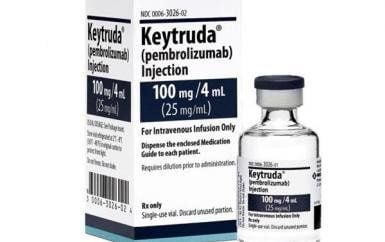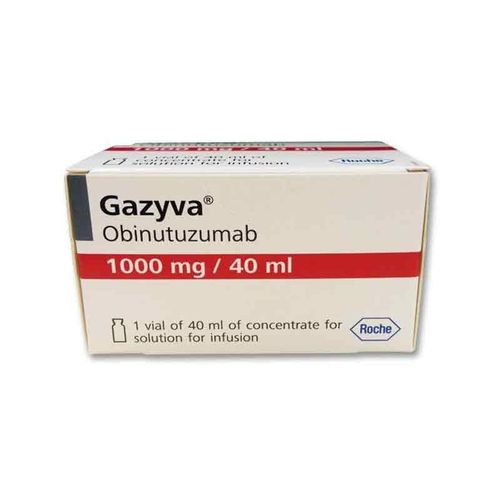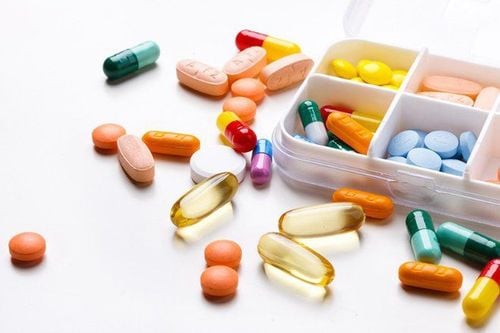This is an automatically translated article.
Palbociclib is a drug used to slow the growth of cancer cells by blocking the action of enzymes. The following article will introduce readers to the things to keep in mind when using this drug.1. What does Palbociclib do?
Palbociclib is a drug that acts as a kinase inhibitor. This is an enzyme that promotes cell growth at various stages. Drugs are used to slow the growth of cancer cells by blocking the action of enzymes. Palbociclib interferes with the growth and spread of cancer cells by inhibiting cyclin-dependent protein kinase 4 (CDK4) and cyclin-dependent kinase 6 (CDK6).
2. How to use Palbociclib properly?
Palbociclib is taken orally in capsule or tablet form and should be taken with food. The patient takes the pill once a day at a certain time of day by swallowing the tablet whole without chewing, crushing, or opening it. In case of missed dose during the day or vomiting after taking it, do not take an extra dose, just take the next dose at the same time every day. The drug may be used in combination with an aromatase inhibitor or a fulvestrant.
It is important when using palbociclib that patients make sure to take the correct amount of medication that the doctor has previously prescribed. Drug levels in the blood can be affected by certain medications such as verapamil, rifampin, ketoconazole, phenytoin, St. John's wort and modafinil. Also, patients should not eat grapefruit or drink grapefruit juice while receiving this therapy as it may affect how the medication is absorbed.
When preparing to administer medication, if a caregiver is preparing a patient dose, consider wearing gloves or pouring medication directly from the container into the lid, small cup, or directly into the patient's hand. Caregivers should avoid touching the tablet directly and should wash their hands before and after giving the medication to the sick person. Pregnant or lactating women should not prepare the drug for the patient to take.
3. Palbociclib side effects
Some of the most common side effects of Palbociclib include:
Decreased white blood cell count
While being treated with this medicine, a patient's white blood cell count may drop causing them to have your risk of getting an infection is higher because white blood cells (WBCs) play a very important role in fighting infections. Therefore, when symptoms such as fever with a temperature higher than 100.4°F or 38°C, sore throat or cold, difficulty breathing, cough, burning when urinating, or pain that does not heal, the patient should Contact your doctor immediately.
Some measures to help limit infection such as:
Wash your hands often for yourself and your family members. This is the best way to prevent the spread of infection. Avoid gathering in large crowds and contact with people who are sick. When working in contact with sandy soil, it is necessary to wear protective clothing including long pants and gloves. Do not handle pet waste. Keep all cuts or scrapes clean. Shower or bathe daily and perform regular oral care. Do not trim cuticles or ingrown nails. You can paint your nails, but not fake nail polish. Anemia
Red blood cells are responsible for carrying oxygen to the tissues in the body. Therefore, when the red blood cell count is low, the patient feels tired or weak. Therefore, it is necessary to contact the doctor immediately if the patient experiences shortness of breath, chest tightness or chest pain. In case the number is too low, the patient can be given a blood transfusion.
Thrombocytopenia
Platelets play a role in blood clotting to prevent blood loss. Therefore, when the platelet count is low, it is difficult for the patient to stop bleeding. Contact your doctor if you notice any excessive bruising or bleeding, including nosebleeds, bleeding gums, or blood in your urine or stools. If the platelet count becomes too low, the patient may receive a platelet transfusion. Some measures to avoid excessive blood loss:
Do not use a razor but an electric razor instead. Avoid sports and contact activities that could cause injury or bleeding. Do not take aspirin (salicylic acid), nonsteroidal anti-inflammatory drugs (NSAIDs) such as Motrin/Advil (ibuprofen), Aleve (naproxen), Celebrex (celecoxib) as these can all increase the risk of bleeding. Do not floss or use toothpicks, but instead use a soft-bristled toothbrush to brush your teeth. Fatigue
Fatigue is very common during cancer treatment and is a feeling of exhaustion that often doesn't go away with rest. During cancer treatment and for a while afterward, patients may need to adjust their work and activity schedules to manage fatigue. Consider scheduling time to rest during the day and save energy for more important activities. Exercise can help combat fatigue by going through a simple daily walk with a friend.
Mouth sores
Some cancer treatments can cause painful sores in the mouth or throat as a side effect. Patients should tell their doctor right away if white, sore, or painful symptoms appear on the inside of the mouth, tongue, or inside of the cheeks. In cases where mouth sores become painful, your doctor may recommend pain medication. Performing regular oral hygiene can help prevent or control these symptoms by:
Brushing your teeth with a soft-bristled toothbrush at least twice a day. Avoid mouthwashes that contain alcohol, and instead gargle with baking soda and/or salt with warm water by mixing 2 teaspoons of baking soda or 1 teaspoon of salt in an 8-ounce glass of warm water and rinsing 4 times. everyday. If your mouth is dry, eat moist foods with plenty of water (6-8 glasses) and suck on sugar-free hard candies. Avoid smoking and chewing tobacco, drinking alcoholic beverages and citrus juices. Hair loss
During cancer treatments, hair may become thin, brittle, or may fall out after two to three weeks of treatment. In addition, the patient also has hair loss on the entire body, including pubic hair, underarm hair, limbs, eyelashes and nose hair. Hair usually begins to grow back soon after treatment is complete.
Diarrhea
Doctors can prescribe medicines to relieve diarrhea. In addition, patients should follow a healthy diet that includes eating bland, low-fiber foods such as white rice and boiled or grilled chicken. Avoid eating raw fruits, vegetables, wholegrain breads, cereals, and seeds. Soluble fiber is found in some foods and absorbs fluids, which can help relieve diarrhea. Foods rich in soluble fiber include: apple sauce, ripe bananas, canned fruit, orange portion, boiled potatoes, white rice, products made with white flour, oatmeal, cream of rice, cream of rice noodles and fries. Especially when having diarrhea, the patient should drink a lot of water every day to rehydrate the body.
Effects on the fetus
When the fetus is exposed to this drug, it can cause birth defects, so the patient should not have a baby while taking this medicine. Safe fertility is considered to be at least 3 weeks after treatment for women and 3 months after treatment for men. In addition, patients should not breast-feed while taking this medicine or for 3 weeks after the last dose. Palbociclib is a drug used to slow the growth of cancer cells by blocking the action of enzymes. To ensure the effectiveness of treatment and avoid unwanted side effects, patients need to strictly follow the instructions of the doctor, professional pharmacist.
Follow Vinmec International General Hospital website to get more health, nutrition and beauty information to protect the health of yourself and your loved ones in your family.
Please dial HOTLINE for more information or register for an appointment HERE. Download MyVinmec app to make appointments faster and to manage your bookings easily.
Reference source: oncolink.org












